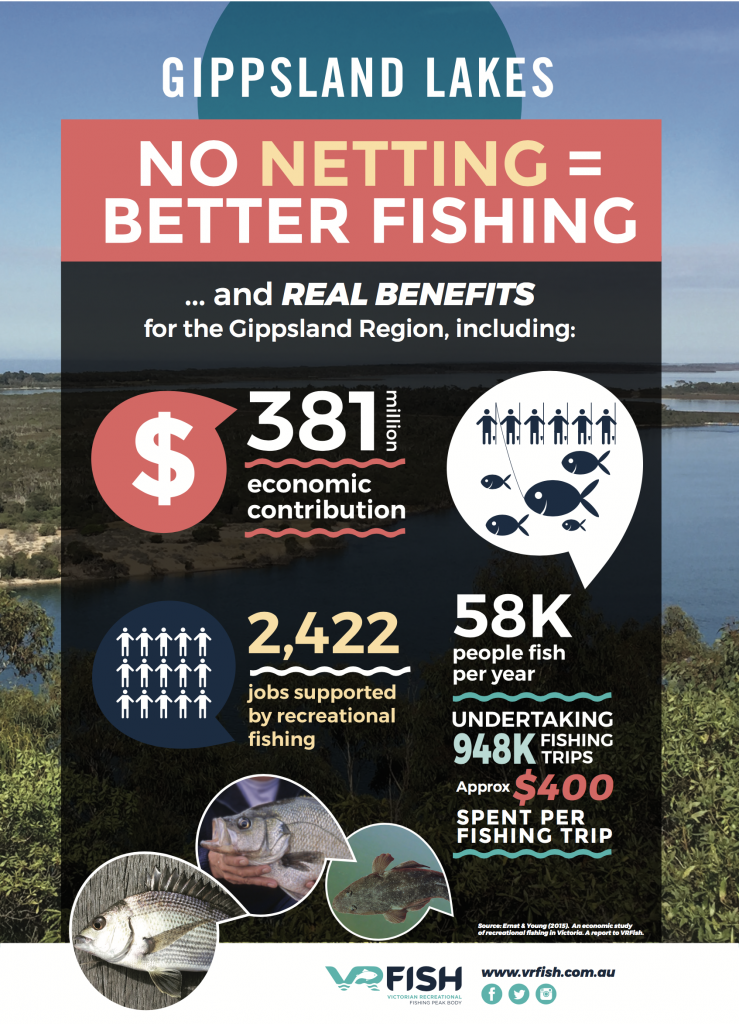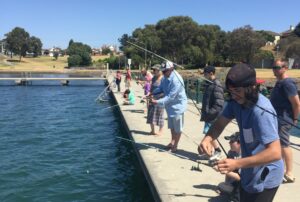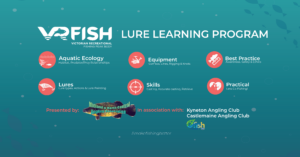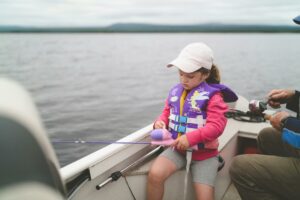August 3, 2018
Are you one of the many fishers that used to fish the Gippsland Lakes? After the halcyon days of the 1970s and 1980s, what was once a fishing paradise has regrettably flatlined for nearly two decades. Frustrated local recreational fishers believe the Gippsland Lakes Fishery is now at a tipping point, not able to support both a quality recreational fishery and a commercial net fishery.
VRFish has listened carefully to these concerns and are calling for a comprehensive policy change to recover the fishery and make fishing better through:
- A fair and respectful compulsory buy-out of all 10 Gippsland Lakes Fishery Access Licenses;
- A review of recreational fishing bag and size limits for black bream;
- A plan to address factors suppressing the natural recruitment of black bream, including habitat improvement and mitigating saline intrusion, and implement a restocking program.
Recreational fishers David Warren and Jacqueline Kennon are spearheading a local campaign to bring an end to commercial netting in Gippsland Lakes. The campaign is fast growing momentum with the formation of the Gippsland Lakes Recreational Fishing Alliance which brings together all the recreational fishing leaders in the community.
“We started investigating the issue in late 2017 when we were overwhelmed with the number of our and other angler friends complaining about the lack of fish in the Gippsland Lakes,” said David Warren.
“The damage to the Gippsland Lakes fishery is the cause of considerable anger among local and visiting anglers as well as local businesses that service the recreational fishing sector.”
“The aim in removing commercial nets would be a first step towards establishing a recreational fishing haven similar to St Georges Basin in NSW, with obvious flow on benefits to the regional economy.”
VRFish agrees that when the bream fishery in the Lakes is not performing as it should be, the local economy suffers. The impact on businesses such as hotels, restaurants, cafes, petrol stations, tackle shops and supermarkets are significant. We estimate that recreational fishing is worth $381 million to the regional Gippsland economy each year, with an average spend per fishing trip of around $400.
There are currently 10 access licences in the Gippsland Lakes, which have slowly declined through attrition or previous voluntary buyouts. Despite the decline in the number of licences the fishing quality has continued to deteriorate. The commercial catch of black bream over the past 4 years has been around 40 tonnes, a decline of more than 93% since the catch in 1974/75.
The recreational catch and quality has also declined over the same time with many anglers and clubs choosing to now bypass the Lakes completely.
“What we are seeing is fishers are now opting to target black bream in the more productive waters of our smaller East Gippsland estuaries from Lake Tyers to Mallacoota where commercial netting ceased 15 years ago,” said David.
The Gippsland Lakes are 3.5 times larger than Mallacoota, Tamboon, Sydenham, Marlo and Lake Tyers combined, yet it is far less productive.
The decline in ecology and productivity can be linked to significantly reduced freshwater flows and a permanent entrance to the ocean increasing the salinity of the system. This has had a profound and detrimental effect on the spawning patterns and recruitment of our favourite species such as black bream, estuary perch and Australian bass.
Decline in water quality through industrial, agricultural, and domestic pollution and a lack of fish habitat further exacerbates the decline in fishing quality.
“Our vision is to put Gippsland Lakes back on the fishing map as Victoria’s premier estuarine fishery,” said David.
“The first step is to remove the commercial nets out of Gippsland Lakes,” said David.
Call to Action for Recreational Fishers
You can support the campaign by:
- Signing the Change.org petition
- Joining the Gippsland Lakes Recreational Fishing Alliance
- Make a donation to the campaign through MyCause
- Follow the Facebook pages
- Attend one of the planned Community Meetings to learn more and discuss the issue with your fellow fishers.








